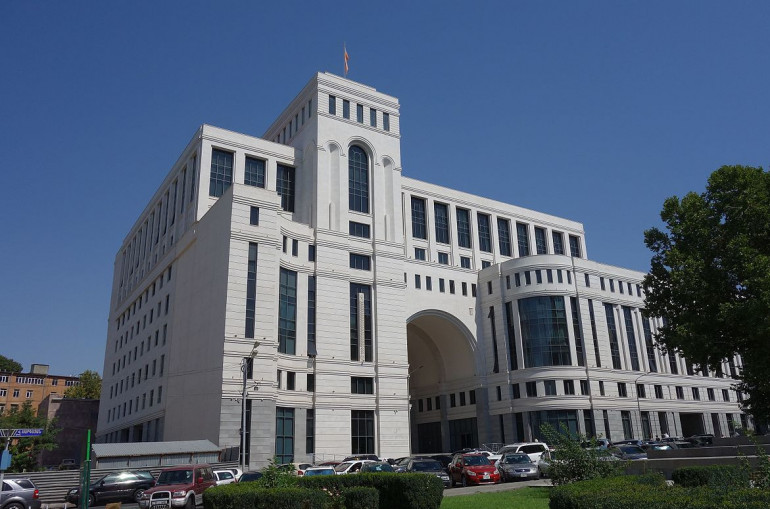The Armenian Foreign Ministry has strongly condemned the resolutions adopted at the 51st Session of the Council of Foreign Ministers of the Organization of Islamic Cooperation (OIC), held in Istanbul on June 21. Armenia described the language and content of the Istanbul Declaration and the Azerbaijan-proposed resolutions as “distorted and extremely one-sided,” emphasizing that the positions expressed in these documents run counter to the logic and interests of establishing lasting peace in the region.
The session concluded with the adoption of several resolutions that strongly endorsed Azerbaijan’s positions on key regional issues—particularly the narrative of the so-called “Western Azerbaijan Community.”
The Istanbul Declaration welcomed progress in the Armenia-Azerbaijan peace process and called on Yerevan to remove all remaining legal and political barriers to signing a peace treaty. It reaffirmed support for Azerbaijan’s reconstruction and demining efforts and condemned Armenia’s refusal to engage with the “Western Azerbaijan Community,” reiterating the group’s claimed right to return to Armenian territory.
The Declaration also called for the rehabilitation and reconstruction of territories it described as severely impacted by Armenian aggression, urging OIC member states to support Azerbaijan’s demining efforts. It expressed concern over what it described as the forced and systematic expulsion of hundreds of thousands of Azerbaijanis from Armenia and condemned the destruction and misappropriation of Islamic cultural heritage there, calling it a serious violation of international law. Furthermore, it reaffirmed the supposed right of return of these Azerbaijanis and criticized Armenia’s refusal to engage with organizations advocating on their behalf.
One of the most prominent outcomes was the adoption of a resolution titled “The Right to Return of Azerbaijanis Forcibly and Systematically Expelled from Present-Day Armenian Territory.” This marked the first time the OIC had formally addressed the so-called “Western Azerbaijan Community,” lending it institutional support.
In response, the Armenian Foreign Ministry drew the attention of OIC member states to what it called a clear territorial claim by Azerbaijan against the sovereign territory of the Republic of Armenia, disguised under the pretext of human rights. It stressed that this claim is even reflected in the founding documents of a so-called “organization” artificially created for that purpose.
“Western Azerbaijan refers to Azerbaijan’s own western regions—namely, Qazakh, Tovuz, Aghstafa, Gadabay, Dashkasan, Kalbajar, Lachin, Gubadli, Zangilan, and Nakhichevan. There is no such place as ‘Western Azerbaijan’ on the territory of the Republic of Armenia—nor can there be,” the ministry said.
Regarding the history of Azerbaijani residents in Soviet Armenia, the ministry stated that they voluntarily left in the final years of the USSR, having managed to sell or exchange their property or receive compensation from the Armenian government.
“Unfortunately, the same cannot be said for the fate of Armenians in Azerbaijan—in Baku, Sumgait, and other places—where massacres and forced displacement of Armenians took place,” the MFA continued. “The most recent manifestation of this in our region was witnessed by the world in the fall of 2023, when over 115,000 Armenians were forced to flee Nagorno-Karabakh, subjected to ethnic cleansing.”
The Ministry further stated that the indirect encouragement of such behavior by the OIC creates a logical inconsistency with the organization’s stated stance on the crisis in the Middle East over the past two years.
The statement also criticized the declaration’s reference to the Khojaly events, describing the misinterpretation as astonishing.
“The true history of crimes against humanity is well-known and directly refutes any accusations against the Republic of Armenia.”
The Foreign Ministry added that it is regrettable the declaration deviated from earlier statements made by OIC members in March 2024 and afterward, which encouraged the signing of an agreement on the establishment of interstate relations and peace between Armenia and Azerbaijan. Instead, the adopted texts included one-sided assertions about alleged preconditions for peace.
“Armenia has expressed its readiness to sign the Agreement without any delay, proposing to start consultations on the venue and date of its signing, as well as offering constructive solutions to address a number of issues raised by Azerbaijan,” the MFA said. “It would be more logical for partners interested in establishing peace in the region to urge Azerbaijan to sign the agreement without unnecessary delay, refraining from creating artificial obstacles.”
Another matter of deep regret, the ministry noted, was the resolution on the protection of cultural heritage.
“Ignoring the ongoing destruction of Armenian cultural heritage under Azerbaijani control and the systematic acts of vandalism against it, the resolution frames the issues with religious connotation, thereby fueling false and dangerous narratives,” it stated.
The ministry also reaffirmed that Armenia’s respect for and careful treatment of Islamic cultural heritage is well known and easily provable.
Finally, the MFA called on OIC member states that supported the aforementioned declaration and resolutions to review and resolutely reject biased initiatives that threaten Armenia’s territorial integrity and sovereignty and jeopardize the normalization process between Armenia and Azerbaijan.
“There is a genuine opportunity to establish peace in the South Caucasus,” the statement concluded. “However, any such approach demonstrated by an international organization does not contribute to the effective realization of that opportunity. The Republic of Armenia remains committed to the strategy of implementing the peace agenda and expects from its international partners, including the Organization of Islamic Cooperation, support for the efforts to establish lasting and sustainable peace between Armenia and Azerbaijan.”
About the Organization of Islamic Cooperation (OIC):
The Organization of Islamic Cooperation (OIC) is the world’s second-largest intergovernmental organization after the United Nations, comprising 57 member states spread across four continents. While most are Muslim-majority countries, a few are not. The OIC describes itself as “the collective voice of the Muslim world.”


